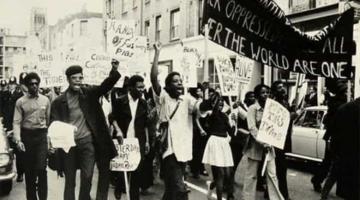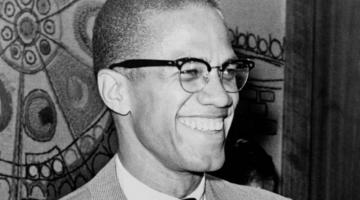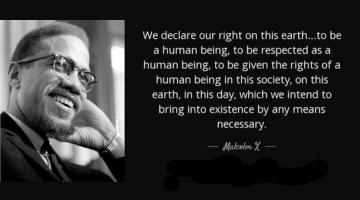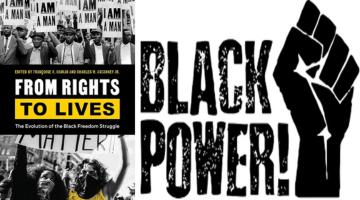Malcolm X was a legendary revolutionary who is still loved by millions of people. The anniversary of his assassination is an opportunity to reflect on his impact.
February 21, 1965, a diversionary scuffle broke out in the Audubon Ballroom in Harlem as el-Hajj Malik el-Shabazz, known as Malcom X, addressed the people of Harlem and, as a result of his international standing, the people of the world. As the attention of the attendees moved toward the scuffle, at least two men approached the stage with weapons. Malcolm’s last words were “don’t do it.” But they did. Pumping Malcolm’s body with bullets and a fatal shotgun blast that took Malcolm from us physically.
What the assassins and the evil powers behind the assassination could never understand was that they did not kill Malcolm. Yes, the body of Malcolm, his energy, his physical presence was no longer with us. But as an African ancestor, his revolutionary spirit never left. It has been animating generations, of not only African anti-colonial revolutionaries, but anti-colonial revolutionaries around the world since that fatal day in 1965.
I have had the opportunity to move around the world through spaces occupied by revolutionary movements and states over the last 50 years. In the beginnings of my travels, I was struck by the consistent revolutionary iconography that I encountered. From the walls of huts that served as meeting places for activists in the forests in the global South, to grand spaces in the offices of movements that had gained some degree of state power in places like Vietnam, Nicaragua, North Korea, I would see consistently certain images – Karl Marx, Che Guevara and Malcolm X!
Malcolm is loved by the people of the world.
Malcolm’s uncompromising revolutionary spirit and political understanding of the fundamental interconnections of the domestic with the international influence a generation of emerging revolutionaries in the U.S. African/Black revolutionaries like Robert Williams and the Revolutionary Action Movement, the Student Non-Violent Coordinating Committee (SNCC) and the Black Panther Party and other formations understood that, “You can’t understand what is going on in Mississippi if you don’t know what is going on in the Congo.” That internationalist perspective and practice politically and structurally integrated the struggles of Africans in the U.S. into the global anti-colonial/anti-capitalist movement.
This development provided the continuity of the African/Black radical internationalism from David Walker’s appeal through the Pan African movement; Garveyism; the mobilizations against the Italian invasion of Ethiopia in 1935 and the battle against fascism in Spain; anti-colonial agitation at the United Nations; the wars in Korea; Vietnam and the fight for national self-determination of African nations throughout the African world.
The anti-colonial internationalism that Malcolm embodied and our movement continued after his assassination placed Malcolm in a place of reverence throughout the colonial world. A few years ago that universal appreciation was on display in Beirut, Lebanon where anti-colonial fighters, academicians and activists joined in a week long celebration of Malcolm that included a conference that I participated in and a play written on Malcolm’s visit to Beirut in 1964 where he was first denied an opportunity to speak but as a result of the actions of students he was allowed to speak on his second visit in September of that year.
It was a moving experience to see the love and regard that people had for Malcolm, and by extension our movement.
What was Malcolm’s appeal? His simple but profound language that the oppressed and colonized instantaneously understood. On the question of liberation and human rights Malcolm reminded the oppressed that If you are not ready to pay the price required to experience full dignity as a person and as members of a self-determinant people, then you will be consigned to the “zone of non-being,” as Fanon refers to that place where the non-European is assigned. Malcolm referred to that zone as a place where one is a sub-human:
“You’re an animal that belongs in the cotton patch like a horse and a cow, or a chicken or a possum, if you’re not ready to pay the price that is necessary to be paid for recognition and respect as a human being.
“And what is that price?
“The price to make others respect your human rights is death. You have to be ready to die… it’s time for you and me now to let the world know how peaceful we are, how well-meaning we are, how law-abiding we wish to be. But at the same time, we have to let the same world know we’ll blow their world sky-high if we’re not respected and recognized and treated the same as other human beings are treated.”
The enemy of collective humanity fears liberating knowledge and the example of a Malcolm. That is why in their shortsightedness they thought that they would be rid of him if he was physically eliminated. They were wrong. Malcolm, like so many of our revolutionaries, will never die. They live in the memory and consciousness of the people and become manifest materially through the struggles of the people. Malcolm will be with us until we prevail. There are many more of us who are marked. But because we are ready to pay the ultimate price, we have no fear.
Revolutionary love brother Malcolm.
El-Hajj Malik el-Shabazz, Malcolm X Presente!!
Ajamu Baraka is the national organizer of the Black Alliance for Peace and an editor and contributing columnist for the Black Agenda Report. Baraka serves on the Executive Committee of the U.S. Peace Council and leadership body of the U.S. based United National Anti-War Coalition (UNAC) and the Steering Committee of the Black is Back Coalition.



















